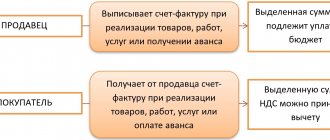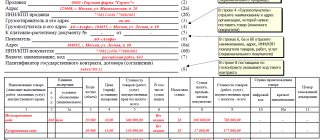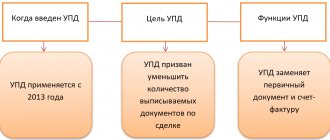As a general rule, a document such as an invoice is the basis for the buyer to accept the VAT amounts presented by the seller for deduction. This procedure is regulated by Chapter 21 of the Tax Code of the Russian Federation. In this consultation we talk about when an advance invoice is issued in 2021.
Also see:
- VAT rates in 2021: table
- VAT on advances may be canceled
- New invoice form in 2021
Advance and tax accrual
According to the law, if the seller has received an advance from the buyer, he must remember to charge VAT on it.
So, on the basis of paragraph 2 of Art. 153 of the Tax Code of the Russian Federation, when determining the tax base for VAT, revenue from sales (sales) is determined based on all income of the payer associated with settlements for payment for goods (work, services) received by him in cash or in kind.
Moreover, as a general rule, the law considers the earliest of the following dates to be the moment of determining the tax base (clause 1 of Article 167 of the Tax Code of the Russian Federation):
- day of shipment or transfer of goods/works/services;
- the day of payment or partial payment for upcoming deliveries of goods/performance of work/provision of services.
Simply put, having received an advance payment for the supply of goods, performance of work or provision of services, the seller must charge VAT for payment to the budget. The calculated rate will be 20/120 or 10/110 (clause 4 of article 164 of the Tax Code of the Russian Federation).
The choice of tax rate (0%, 10% or 20%) depends on the rate at which the law (Article 164 of the Tax Code of the Russian Federation) applies to the sale of specific goods, performance of work or provision of services for which the seller (supplier) received an advance .
Form and details
The required details for issuing invoices are established by Art. 169 of the Tax Code. Moreover, for “advance” documents and invoices for shipment, different lists of them are provided. According to clause 5.1 of Art. 169 of the Tax Code, an “advance payment” invoice must necessarily contain the following details: - serial number and date of the invoice; — name, address and identification numbers of the taxpayer and buyer; — number of the payment and settlement document; — name of the goods supplied (description of work, services), property rights; — name of the currency; - the amount of payment, partial payment for upcoming deliveries of goods (performance of work, provision of services), transfer of property rights; — tax rate; - the amount of tax imposed on the buyer of goods (works, services), property rights, determined based on the applicable tax rates. In the situation under consideration, the invoice form should be used standard, that is, approved by Decree of the Government of the Russian Federation of December 2, 2000 N 914 (Letter of the Ministry of Finance of Russia dated March 6, 2009 N 03-07-15/39). Of course, the Cabinet of Ministers should develop a special “advance” form, as well as, in principle, a new form of invoice, providing, among other things, a place to reflect the name of the currency (Clause 8 of Article 169 of the Tax Code, Letter of the Ministry of Finance of Russia dated 12 October 2010 N 03-07-09/46). However, as they say, things are still there. However, this fact does not prevent the buyer from applying the “advance” deduction of VAT in practice. Let's consider the order of reflecting mandatory details on the lines of the invoice.
Deadline for issuing an advance invoice
But when is the invoice issued for the advance payment due? According to the law, when selling goods, performing work or providing services, an invoice is issued no later than 5 calendar days , counting the day of shipment of goods (performance of work, provision of services).
Accordingly, an “advance” invoice must also be issued within 5 calendar days from the date of receipt of the advance payment. This is stated in paragraph 3 of Art. 168 Tax Code of the Russian Federation.
When the last day of the period for issuing an advance invoice falls on a weekend or a non-working holiday, it must be issued no later than 1 working day following such a day (clause 7, article 6.1 of the Tax Code of the Russian Federation).
Example:
Issue an advance invoice no later than five calendar days from the date of receipt of the advance payment (clause 3 of Article 168 of the Tax Code of the Russian Federation). For example, the advance payment was received on January 29, 2021. You can issue an invoice on any of the following days: January 29, January 30, January 31, February 1 or 2, 2021.
Features of registration in 1C Enterprise Accounting 3.0
Registration of invoices may differ depending on the method of receiving an advance - in cash or through a current account, as well as on the method of creating invoices - manually or automatically.
These features can be reflected in the accounting policy settings, where we get through “Main – Settings – Accounting policy – Setting up taxes and reports – VAT”.
Fig.1 UP settings
Fig.2 Tax and reporting settings
Fig.3 Setting VAT parameters
In the VAT tax navigation, it is possible to set the “Procedure for registering invoices for advance payments”, which will set the method for registering our documents (in our case, we leave the preset one - “... always upon receipt of an advance payment”). Using this method, you can create documents for all amounts received, except for advances credited on the day of receipt. If the products are shipped on the day the funds are received in a bank account or at the cash desk, then the document we are interested in is not created.
Let's see in what order advance payments are received using an example. The buyer transferred RUB 150,000 to the account. against future delivery of goods. It is necessary to reflect the receipt of money through “Receipt to account” using “Bank and cash desk - Bank statements”. We process the receipt of DS from the counterparty-buyer.
Fig.4 Statements
Fig.5 Creation through “Receipt to account”
Fig.6 Document movements
A posting was generated that reflected the received amount of DS for D-t 51 account. and K-tu 62.02 count.
At the same time, the buyer paid 50,000 rubles in cash. In “Bank and Cash-Cash Documents” we create “Cash Receipt”.
Fig.7 Cash invoice
Fig.8 Cash movements
The document created a posting and reflected the received amount of DS for Dtu 50 account. and Ktu 62.02 count.
Let's consider creating invoices manually, directly from the documents Receipt to account and Receipt of cash. Go to “Create based on an issued invoice”. In this case, a new document issued for advance payment will appear. We check the filling and post the document.
Creation in this way is mainly used in cases of a small volume of documents or if a DS accounting specialist is responsible for the invoice.
Fig.9 Creation via “Invoice issued for advance payment”
Fig. 10 Document movements for advance payment
The generated invoices will be filled in automatically. Before you conduct it, you need to check whether the details are correct, as well as the contents of the tabular part. After posting, transactions will be created and VAT accrual will be reflected in the Invoice and VAT Sales Journal registers.
When it is not necessary to issue an invoice for an advance payment
An invoice for an advance payment for a transaction is not issued if the advance is received against future supplies of goods (performance of work, provision of services) that satisfy one of the following conditions (paragraph 3 of clause 17 of the Rules, approved by Decree of the Government of the Russian Federation dated December 26. 2011 No. 1137):
- have a production and manufacturing cycle duration of more than six months;
- are taxed at a VAT rate of 0%;
- are not subject to taxation (exempt from VAT).
According to the Russian Ministry of Finance, it is also not necessary to issue an invoice for prepayment if the shipment occurred within 5 calendar days from the date of receipt of the advance payment for this shipment (letter dated November 10, 2016 No. 03-07-14/65759).
Thus, the deadlines for issuing advance invoices have not changed recently.
Read also
15.05.2019
Decor
The invoice must be issued on a special form , which is confirmed by Decree of the Government of the Russian Federation dated December 26, 2011 No. 1137. The invoice must include:
- number, date of the document (in the case of using the 1C program, the prefix A is added to the number);
- imprint of your company;
- output information of your counterparty;
- information about the act under which the advance was transferred.
If on 1 day there were a number of transfers from the 1st buyer, then the following will need to be entered in the invoice:
- all payments;
- payment currency, its code;
- required payment amount;
- name of the product for which the advance is transferred (from the existing contract);
- the amount of VAT on a particular product in the format 18/118, 10/110;
- direct VAT amount.
Registering an advance invoice
Currently, accountants have the opportunity to register advance invoices in the book of purchases and sales (clause 2 of Appendix 5 of Government Decree No. 1137). If the customer received an invoice from the supplier based on the prepayment, then such a payment document can be reflected in the current purchase book. The contractor himself indicates the account in the sales book. When sellers have received advance payment for goods, works or services supplied, they must enter an invoice for the advance in their purchase ledger.
This news will significantly simplify the procedure for presenting documentation for deduction of value added tax. It does not matter how the payment is made - cash or non-cash. But if mutual settlements for goods supplied, work performed or services rendered are made in a non-cash form, then the advance invoice is not recorded in the purchase book.
The procedure for issuing a document during implementation
Let's consider a basic example - the seller releases the goods, and the buyer makes payment upon delivery. The invoice is issued within 5 days, starting from when the goods were shipped, services were provided or work was performed.
One copy of the invoice is issued for the supplier himself, the second for the buyer. The document must be registered in the Invoice Journal (hereinafter referred to as the Journal). In addition, the seller makes an entry in the Sales Book and indicates the details of the corresponding invoice. And the buyer, accordingly, makes a similar entry in his Purchase Book.
When is an advance invoice issued?
The rules for issuing invoices for advance payments are regulated by Article 168 of the Tax Code of the Russian Federation. According to the rules of the Tax Code of the Russian Federation, the supplier is obliged in any case to issue an invoice to the buyer if he pays an advance, and this must be done within five days. Prepayment can come in both monetary and material form.
But tax legislation provides for a number of exceptions in which prepayment invoices are not issued:
- Delivered goods, works, services are not subject to VAT under Art. 149 and paragraph 2 of Art. 146 Tax Code of the Russian Federation;
- delivery is subject to VAT at a rate of 0% (clause 1, article 164);
- goods, works or services have a positive cycle of the production process (Government List No. 468 of July 26, 2006);
- goods, works and services are sold outside the Russian Federation.
At the moment, there is no liability for failure to provide an advance payment from the supplier on time. But if the supplier does not provide the required document within the allotted five days, the customer has the right to go to court and, after a court decision, receive the necessary documentation.
When is an invoice issued?
Most often, the primary document in question is issued by the seller when carrying out transactions that, in accordance with tax legislation, are subject to VAT. The sale of most goods and services, including gratuitous transfers, is subject to taxation. But there are exceptions - they are listed in Article 149 of the Tax Code of the Russian Federation.
Also, companies and individual entrepreneurs working with VAT are required to generate invoices upon receipt of payment for future shipments. Such documents are usually called advance invoices.
In addition, VAT payers are required to issue invoices when exporting to the EAEU countries.
There are cases when the paper is issued by an entity that does not pay VAT. Such an obligation arises for companies and individual entrepreneurs if they, on their own behalf, sell goods that belong to another organization - a VAT payer. We are talking about mediation activities under commission agreements and the like.
Violation of rules and responsibility
What are the risks for a company or individual entrepreneur for violations related to the described document? The law stipulates the deadlines for issuing an invoice, but does not provide for direct liability for exceeding them. But the absence of an invoice is regarded as a serious flaw in accounting. Absence means failure to issue a document in the quarter in which the transaction took place.
For this, the taxpayer may be punished in accordance with Article 120 of the Tax Code of the Russian Federation. If this violation is detected for the first time, the organization may receive penalties in the amount of 10 thousand rubles. If the absence of invoices is revealed in several quarters, the amount of the fine will triple. And in the case where this violation led to an understatement of tax, the fine will be 1/5 of the amount of the underpayment, but not less than 40 thousand rubles.
It must be said that it is quite difficult to “forget” about an invoice when selling a product or service. Even if this happens, the buyer will definitely remind him of the need to draw up a document, because without it he will not be able to deduct VAT. With an invoice for an advance payment, everything is different. Buyers do not always claim VAT deduction from the advance payment, so they do not ask for an invoice. In such a situation, some accountants do not consider it necessary to issue them. They reason like this: receipt of the advance and shipment occur in the same quarter (in most cases), so why issue an interim document? However, the Federal Tax Service considers this a violation if more than five days pass between the receipt of the advance payment and the shipment of the goods.
What deadlines must be met?
As mentioned above, the Tax Code of the Russian Federation, namely in paragraph 3 of Article 168, clearly states the period for issuing an invoice for an advance payment, which is 5 calendar days from the moment when:
- Payment is received in part or in full. Thus, payment is made for work performed, services provided, the purchase of a batch of products, or the vesting of the buyer with rights to certain property.
- The delivery of a consignment of goods, the provision of services in full, and the vesting of the person who paid the money with rights to the property involved in the transaction are carried out.
It is worth noting that the period of 5 calendar days begins to count from the day following the day on which products were issued, services were provided or work was performed.
Even Article 6.1 of the Tax Code of the Russian Federation clearly states that if the last day of the designated period falls on a weekend or holiday, then the end of the established period is postponed to the next working day.
Important! There is an option when the seller issues such a document once for all goods sold at the end of the month.
However, it is worth remembering that such an opportunity is given only to organizations that work in areas that regularly and without interruption deliveries to one counterparty. Enterprises that do not comply with such conditions will have to adhere to standard rules.










